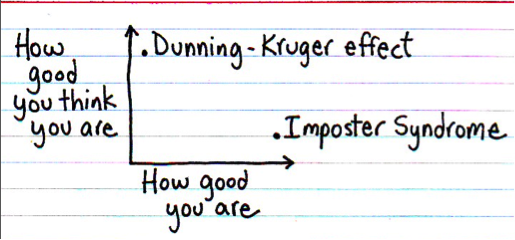Feeling Like a Fraud
By: Erin Crowley, MD
August 11, 2017
This post is a part of our Life as a Fellow blog post series. This series includes "fellow life lessons" from current trainees in leadership with CHEST.
Two months from now I will finally be an attending physician, a position that has been 11 years in the making. The thought of no longer hiding behind the façade of a trainee position is daunting. Now I’m one step closer to possibly being “found out” by my colleagues: I’ll make a dumb management decision and they will know I’m a fraud. This nearly paralyzing fear of being at the limit of my ability has been an undercurrent of my medical training.
Two American psychologists, Pauline Clance and Suzanne Imes, gave this fear a name in 1978: impostor syndrome. They described it as a feeling of “phoniness in people who believe that they are not intelligent, capable or creative despite evidence of high achievement.”1 While these people “are highly motivated to achieve,” they also “live in fear of being ‘found out’ or exposed as frauds.”1
Sufferers of imposter syndrome have trouble putting insecure feelings into perspective and worry about their errors, not recognizing that their colleagues make them too. They attribute their successes to factors beyond their control, while attributing the successes of their peers to skill. At the root of the problem is an unrealistic notion of what it means to be competent and setting the internal bar impossibly high #overachieverfulminans). This leads to negative coping mechanisms such as procrastination, perfectionism, or overpreparing.
How does imposter syndrome manifest for me? I feel some of my accomplishments are a result of luck or deceit and that I’ve gotten in over my head. I declared the path to become a physician scientist in clinical research my second year of fellowship. I figured the grant I was awarded was because there were only a handful of other applications. My abstract was accepted because someone on the selection panel knew me. I was going to be “found out” when I presented my data, even though I was reassured I knew the data better than anyone. No way was I smart enough to have done my own statistical analysis; I needed a statistician to double-check my work. I typed out and deleted the first sentence of my first manuscript 12 times. Who am I to put this work out into the world? How the heck did I get an interview at that place? They must be desperate!

The key to combating impostor syndrome has many levels, and for me, it is a constant work in progress. First, it is recognizing the symptoms and naming it. I read and attended a workshop about it. The second valuable point: knowing you aren’t alone. I openly talk about it to other trainees, junior faculty, and senior faculty. I have been surprised to find that the people I admire most worry about their own achievements. This discovery has given me perspective on my own anxieties.
Third, I try to practice accurate self-assessment. For impostors, a disconnect exists between their self-assessment and their actual abilities. I have been practicing acceptance of compliments and praise rather than blowing them off. Going forward in my career I plan to continue to talk about impostor syndrome with my colleagues and mentors; I will continue to try to refine my self-assessments and reframe stressful situations. Lastly, just be glad you don’t have the Dunning-Kruger effect.2
 Dr. Erin Crowley is currently in her last year of fellowship at Indiana University. She will be staying on as an assistant professor in the Adult Cystic Fibrosis Clinic and working in the pulmonary services department. Her research interests include social determinants of health and how they affect outcomes in cystic fibrosis care, specifically in transferring from pediatric to adult care.
Dr. Erin Crowley is currently in her last year of fellowship at Indiana University. She will be staying on as an assistant professor in the Adult Cystic Fibrosis Clinic and working in the pulmonary services department. Her research interests include social determinants of health and how they affect outcomes in cystic fibrosis care, specifically in transferring from pediatric to adult care.
1. Clance PR, Imes SA. (1978). The impostor phenomenon in high achieving women: dynamics and therapeutic interventions. Psychotherapy Theory, Research and Practice. 1978;15: 241-247. http://www.paulineroseclance.com/pdf/ip_high_achieving_women.pdf 
2. Eisenberg K. Imposter syndrome (and how to punch it in its stupid face). KimEisenberg Consulting. https://kimeisenberg.com/blog/career-strategy/imposter-syndrome-were-thinking-about-it-all-wrong/ Accessed May 15, 2017.